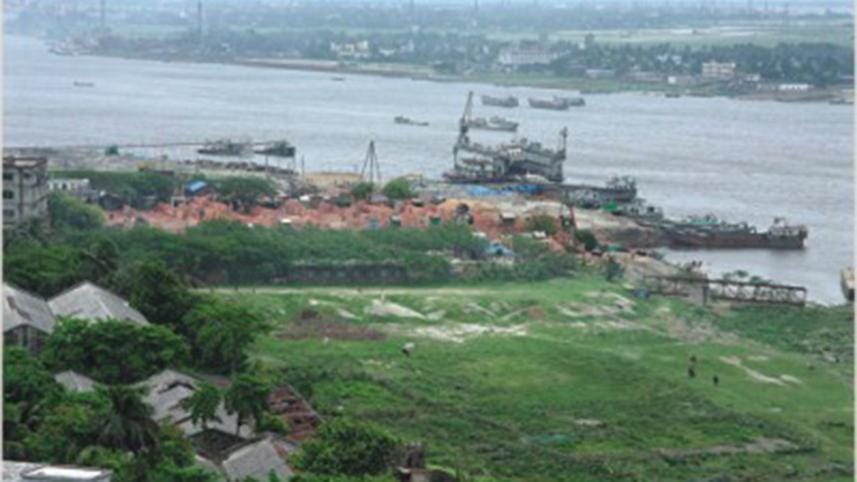Sincerity the answer

Commitment of the government, tough enforcement of environmental laws and formation of an effective river authority are the key to save the rivers physically and biologically.
The government must step forward to save the rivers and acquire land, if necessary, in addition to recovering the grabbed riverbanks. Otherwise, the Dhaka city will be unlivable in near future, said experts while talking to The Daily Star.
They also said steps should be taken so that the grabbers may not mislead the courts by showing fake documents and obtain stay orders or status quo on eviction drives.
Only setting up of effluent treatment plants will be not enough. The government should recover and excavate the encroached land and turn those into parts of the rivers again, they added.
They reiterated that introducing strict laws and forming new authorities may turn futile if the government does not work sincerely since many recommendations were in vain due to lack of political commitments.
Over the years, the government failed to enforce the existing laws regarding rivers and other natural water resources, apparently encouraging rampant encroachment on the rivers and canals.
The first law in this regard was the Bengal Canal Act, 1864, the mother law about rivers and canals.
All the laws that followed up to the recent Open Space and Water Body Conservation Act, 2000 restrict changing the characteristics of the rivers, riverbanks and other the water bodies.
But successive governments have so far failed to protect these natural resources. Though the government had launched two environmental courts -- one in the capital and another in Chittagong -- those became inefficient in course of time.
Members of the civil society, environmental activists and experts have all put emphasis on strict enforcement of the laws and amendment of the laws, if necessary.
Speaking on the issue, Prof Muzaffer Ahmad said the government should maintain the rivers according to the cadastral survey (CS).
"If we consult the CS survey we'll get the original width of the rivers and should demark the riverbanks accordingly. If the government needs to acquire land for that, it should do that," he observed.
The government may also constitute a single river authority if it works better in that way, but "the government has to be very strict about that," he added.
Earlier, a taskforce about the rivers recommended several steps to recover the encroached land and excavate those again, but those recommendations were not implemented properly.
Prof Muzaffer recommends engaging local people in the management process of the rivers. He fears that the entire river system will collapse if the campaign launched against encroachment and pollution fails.
"If we fail to bring any success through this campaign, not only Dhaka but the entire river system of the country will be destroyed," he observed.
"The initiative is undoubtedly a good one for the country. Though late, it has always been very necessary for the country. I hope the initiative would gain huge success," he added.
Muzaffer also recollected the launch of a movement to save the Buriganga 12 years ago and how it ended in vain.
"The Buriganga is the symbol of our total river system. The Daily Star and Channel i have advanced the movement I lost 12 years back," he said.
Member of the parliamentary standing committee on the environment ministry and Awami League lawmaker Saber Hossain Chowdhury said, "The existing laws to safeguard the rivers are not coming in any help as there is weakness and flaws in those.
"We have to save our rivers by identifying the sources of pollution at first and then take views and opinions from the experts on what to do," Saber added.

Ruling AL lawmaker Suranjit Sengupta said the existing laws are not adequate to save the rivers. He has pledged to amend the laws related to the rivers.
Evicting structures from the riverbanks is not enough, said river expert Dr Ainun Nishat. The government must turn the filled-up land into rivers again, he added.
Nishat went on to say that the end of pollution and keeping the original shape of the rivers are also equally important.
"The government should save the rivers both physically and biologically. If the government needs to be strict about this, it should do that," he added.
The judiciary has to play a significant role and the encroachers and those who produce fake documents should be punished, he observed.
"We have been talking about the problems for long but we did not have a loud voice. The Daily Star and Channel i have given us that voice. Somebody needs to push it forward. We are hopeful that a force is in effect to save the rivers.
"And this is almost the last resort for us. We cannot save our rivers if this move fails to yield any success," Dr Nishat added.
Syeda Rizwana Hasan, chief executive of the Bangladesh Environmental Lawyers Association (BELA), said the government should inform the judiciary about the latest developments.
The petitioners often mislead the courts by providing fake documents and grab the riverbanks by putting the issue into law tangles, she said.
She added the Office of the Attorney General or the river authorities could set up a panel of lawyers so that it can move regularly on environmental issues.
She cited an example of neighbouring India saying the judges there hear a panel of lawyers on Saturdays about the latest situation so that they can be updated.
"There is not a single sector in Bangladesh which can deny the necessity of the rivers," said AF Hassan Ariff, former adviser to the caretaker government, at a programme arranged by The Daily Star.
State Minister for Environment and Forests Mostafizur Rahman admitted the government's failure in taking effective actions against the polluters and encroachers due to some legal complexities in the past.
He said the government will this time take allout measures to save the rivers.
The minister was speaking at a press briefing ahead of the World Environment Day. He said the government is working to bring necessary changes in the laws and assured to take action against the polluters and grabbers.




 For all latest news, follow The Daily Star's Google News channel.
For all latest news, follow The Daily Star's Google News channel.
Comments